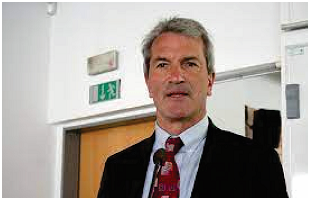German Ambassador to Liberia, Jakob Haselhuber, has called on the Liberian government, Food and Agriculture Organization (FAO) and other partners to collaborate towards effective policy reforms on agriculture and investment programs that will boost food security in Liberia.
He said this will help boost responsible agricultural investment that will benefit the people and the planet stating that Germany has supported FAO to enhance a responsible agriculture and investment program in Liberia.
Haselhuber emphasized that it is critical to stimulate investments that will effectively contribute to the eradication of poverty and hunger by creating decent jobs and conserving the environment.
Stimulating such responsible agricultural investment, he noted requires strong institutional, legal, regulatory and incentive frameworks, and collaboration of all actors involved.
Haselhuber made these comments recently in Margibi County at the close of the week on the FAO’s High-Level Strategy Engagement Meeting on Boosting responsible investment in agriculture and food system in Liberia for sustainable development.
“I am glad that this support has resulted in practical and actionable policy proposals, such as the revision of investment and investors screening policy which are both critical to maximize opportunities and the risk of investment,” he added.
Haselhuber stated that for Liberia to be able to achieve such a beneficial program, it requires a strong collaboration of all actors that are involved in the sector, adding that Germany has been an import partner to FAO, supporting the application of the committee on “the very food security principles, forest investment, and agriculture and food system in Liberia and beyond.”
He noted that enhancing agriculture and food productions is undoubtedly critical, especially in tackling issues that have become almost endemic in the fight against global stunting or hunger in local communities, stating that tightening regulations on food production will not only reduce stunting but also widen the scope of operation of the sector.
Haselhuber stated that in Liberia, the COVID-19 pandemic and Russia’s unwarranted war against Ukraine have led to a further increase in the prevalence of poverty and hunger estimating 47.6 percent for poverty and 38.3 percent for hunger, respectively.
Going forward the German said: “We also learned yesterday that the children 0-5 years still suffer from stunting and wasting and the child mortality is still too high. Even if these figures have come down, thanks to common efforts by the government, partners, Non-Governmental Organizations for the people of Liberia.”
He, however, mentioned that still 29.8 percent of children suffer from stunting and 3.4 percent from wasting, adding, “I am referring to children 0-5 years of age; that is a crucial age for the development of a child and of a future citizen.”
According to Haselhuber, in 2015, FAO, International Fund for Agricultural Development (IFAD), and World Food Programme (WFP) estimated that an additional US$140 billion investment in agriculture and food systems was needed to achieve Sustainable Development Goals (SDG) 1 and 2 by 2030.
Increasing responsible investment in agriculture and food systems is among the most efficient strategies to fight against poverty and hunger in Liberia, he said.
In 2015, the FAO, the IFAD and the WFP estimated that Liberia needed an additional annual US$1.5 billion investment in agriculture and rural development to achieve the first two SDGs by 2030.
Against the backdrop of a global economy, which has been fragile by recent sanitary, geopolitical and socio-economic crises, the actual figures are likely to be much higher today.
FAO has supported inclusive and demand-driven processes to enhance policies and institutions for responsible investment in agriculture and food systems in Liberia since 2019, with support of the Federal Republic of Germany and the Flexible Voluntary Contribution (FVC).

